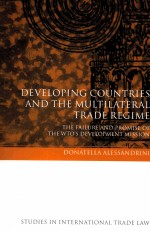

DEVELOPING COUNTRIES AND THE MULTILATERAL TRADE REGIME THE FAILURE AND PROMISE OF THE WTO’S DEVELOPPDF电子书下载
- 电子书积分:11 积分如何计算积分?
- 作 者:
- 出 版 社:OXFORD AND PORTLAND,OREGON
- 出版年份:2010
- ISBN:1849460302
- 页数:261 页
INTRODUCTION - THE FAILURE AND THE PROMISE OF THE MULTILATERAL TRADING REGIME 1
Ⅰ The ‘Science of Development’ and ‘Capitalist Imperialism’ 4
Ⅱ Development as a ‘Discourse’ and Development as a ‘Trap’ 7
Ⅲ Outline of the Chapters 10
1 THE BRETTON WOODS CONFERENCE: TRADE AND THE CIVILISING MISSION’ IN THE POSTWAR INTERNATIONAL TRADING REGIME 14
Ⅰ The Mandate System and ‘the Science of Development’ 16
A Freedom of Transit and Equitable Treatment: The First Regulatory Attempt at a World Trade Order… 20
B …and the Extension of Market Imperatives 22
Ⅱ The Bretton Woods Conference and the Postwar International Economic Order 23
A Grounding ‘Non-Discrimination’ and ‘Equal Treatment’ in Trade Relations 26
B The Draft Charter and the London Conference: Of Rules and Exceptions 29
C The Free-Trade Contradictions of the Charter: Structuring the International Division of Labour 31
D The Investment Provisions: Protecting Capital Abroad 34
E The Outcome of the ITO Negotiations 36
Ⅲ The General Agreement on Tariffs and Trade (GATT) 37
Conclusions 38
2 THE ‘SCIENCE OF DEVELOPMENT’ AND THE GATT NORM 41
Ⅰ The Emergence of the Development Enterprise 43
A The ‘Professionalisation’ and ‘Institutionalisation’ of Development 45
B Development Economics’ ‘Growth’ and ‘Progress’ 46
C Development Economics’ Normative Assumptions 48
D Reformist Dependency Theories and the Development Matrix: The Structuralist School of Thought 51
Ⅱ The GATT Development Mission 55
A The GATT First Review Session: Positing Developing Countries’ Failure 57
B The Haberler Report and Committee Ⅲ: Tracing Discrimination 58
C The GATT Part Ⅳ: Discharging Responsibility 60
D Enabling Non-Reciprocity 62
E A ‘Differential and More Favourable Treatment’? 64
F Assessing the GATT’s Flexibility 66
Conclusions 68
3 THE NEO-LIBERAL TRANSFORMATION OF DEVELOPMENT THINKING AND THE RENEWED MISSION OF THE MULTILATERAL TRADING REGIME 70
Ⅰ The Neo-Liberal Conversion of Development Thinking 71
A Rational Choice-Based Approach… 74
B …and Failing Institutional Arrangements 76
C Outward-Oriented Policies and Government Controls 77
Ⅱ The Neo-Liberal Transformation of the International Trading Regime 80
A The World Recession and the Restructuring of the International Economy 82
B Towards a Trade-Service-Investment Driven Market Integration: Enter the ‘New Issues’ 85
C Setting the Scene for the New Mandate 88
D Punta del Este: A Divisive Strategy 90
Ⅲ Developing Countries’ Re-Alignment: Revisiting the Story 93
A From the Oil and Debt Crisis to the Structural Adjustment Policies 94
B The Challenge of Increasing Discrimination 97
C The Pressure Tactic: Unilateralism/Bilateralism/Multilateralism 98
Conclusions 100
4 THE URUGUAY ROUND AND THE CONSTRUCTION OF THE NEW CONSENSUS 103
Ⅰ Old and New Issues on the Negotiating Table, Corporate Activism and the Single Undertaking Approach 105
Ⅱ The Rise of US Protectionism and the Consolidation of the Pressure Tactic 108
Ⅲ The Montreal/Geneva Mid-Term Review: Weakening the Opposition to a Broader Mandate 112
Ⅳ Brussels Ministerial Meeting: Reintroducing Reciprocity 115
Ⅴ From Brussels to Marrakesh: Clinton’s Aggressive Approach to Market Openness 119
Ⅵ The Final Agreement: Towards an Equal Playing Field? 121
A The New Issues… 121
B …and the Same Old Ones 125
Conclusions 128
5 THE WORLD TRADE ORGANISATION: THE POWER OF TRANSNATIONAL CAPITAL AND THE REDUCTION OF DOMESTIC REGULATORY SPACE 130
Ⅰ Assessing the ‘Trade Off’: the Market Access Issues 132
A Agriculture 133
B Textiles and Clothing 134
C Safeguards and Anti-Dumping 135
D Implementation Costs 136
Ⅱ Liberalisation Rhetoric and Practice: Opening Markets, Protecting Capital 138
A Investors’ Rights in Historical Context 139
B The Changing Investment Climate of the 1980s and 1990s: Securing Protection Abroad 142
C The ‘Modest’ TRIMs Agreement 145
D The ‘Flexible’ General Agreement on Trade in Services (GATS) 149
E The ‘Balanced’ TRIPs Agreement 157
Conclusions 163
6 OF FAILURES AND PROMISES: THE MANY LIVES OF THE DOHA DEVELOPMENT ROUND 164
Ⅰ The Road to Doha: Reflecting on the UR Imbalances 165
Ⅱ The Doha Agenda 168
A Principles and Objectives: Multilateralism, Free Trade, Development 168
B Work Programme: Towards a Softening of the WTO Neo-Liberal Agenda? 170
Ⅲ From Cancun to Geneva: Emerging Oppositions 176
Ⅳ Reaction to Cancun: Silencing Dissent 180
Ⅴ GATS ‘Flexibility’: Rhetoric and Negotiating Practice 182
A The Safeguard Mechanism and Liberalisation of GATS Mode 4: An Uncertain Future 183
B Targeting Non-Discriminatory Domestic Regulation: GATS Article Ⅵ 185
C Enter Specific Commitments: The Request-Offer Approach 186
Ⅵ TRIPs: Transfer of Technology v Investors’ Rights 189
A Substantive TRIPs-plus Standards in Investment Agreements 192
B Investor-to-State Dispute Resolution 193
C Expropriation 194
Ⅶ From Hong Kong to Geneva: The Last Breath of the Doha Round? 197
A The July Framework 198
B The Hong Kong Ministerial Declaration 199
C Suspension, Crisis, Resumption 201
Conclusions 202
CONCLUSIONS - THE DEVELOPMENT MISSION OF THE WTO 205
Ⅰ The First Perspective: The Reform of the International Trading System 207
A The GATS and the Financial Crisis 210
B Addressing the Challenge, Strengthening the Mindset 213
Ⅱ The Second Perspective: The WTO and its Civilising Mission 217
Ⅲ The WTO’s Market-Access Mindset 220
Ⅳ The ‘Political Rationality’ of Development 224
Bibliography 228
Index 243
